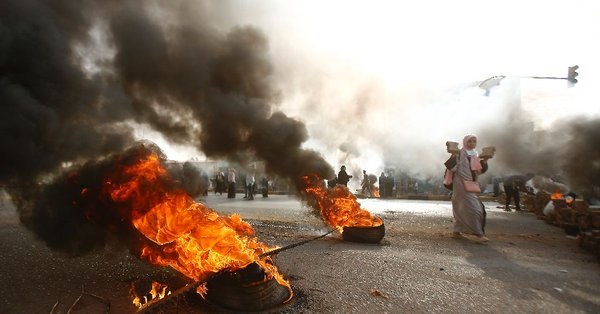
Khartoum, Sudan | AFP | A prominent Sudanese protest leader has voiced fears of more violence against demonstrators at rallies this week, insisting the June 3 “massacre” at a Khartoum sit-in had been planned.
Protest leaders have called for mass rallies against the military on Sunday, the first such nationwide call since the dispersal of a weeks-long protest camp in the capital left dozens of demonstrators dead and hundreds wounded.
“It depends how the military council deals with the protests,” said Babiker Faisal, a prominent leader of the umbrella protest movement, the Alliance for Freedom and Change.
“The brutal dispersal of the sit-in makes us believe that violence may be used against protesters” on Sunday, he told AFP in an interview.
The June 3 crackdown came after talks between protest leaders and generals, who seized power after ousting longtime ruler Omar al-Bashir, collapsed in May over who should lead a new governing body — a civilian or soldier.
About 130 people have been killed since the crackdown began, the majority of them on that day, according to doctors close to the protest movement.
Officials say 61 people died nationwide on June 3.
Tensions have remained high between the two sides since the raid that saw armed men storming the protest camp outside the military headquarters in a pre-dawn assault, shooting and beating demonstrators who had camped there since April 6.
Initially the protesters had gathered at the army complex to seek its support to oust Bashir.
Since the removal of Bashir on April 11, the ruling military council has resisted calls to transfer power to a civilian administration as demanded by demonstrators and Western nations.
– Unexpected ‘brutality’ –
Faisal, a conflict resolution expert, still recalls events ahead of the deadly dispersal of protesters.
He said the movement had contacted the military council a few hours before the raid to ask about the heavy presence of security personnel around the sit-in site.
“We pointed out that there were reports from the site on military gatherings (around the area) and they kept saying (these gatherings) are harmless,” said Faisal, 49.
“We did not expect it would happen… at least not with this level of brutality,” he said.
“We were surprised… by this brutal massacre which shows that it was premeditated.”
Prior to the dispersal, the generals had consistently vowed not to break up the camp.
Even now the military council insists it did not order the dispersal, only saying “excesses” happened when instructions were issued to purge a nearby area notorious for drug peddling.
“If we had the slightest idea of their intention to use bullets and commit killings, we would have dispersed” the sit-in ourselves, said Faisal.
Mobilising protesters has now become a challenge since the raid, with the military rulers imposing a sweeping nationwide internet blockade, especially on mobile telephones.
Some sporadic demonstrations have been held in recent days, but they have been swiftly dispersed by riot police.
In the lead-up to Bashir’s ouster, tens of thousands of protesters were mobilised through social media networks.
But with the internet blackout, protest leaders have now resorted to “extensive campaigns in neighbourhoods, states and regions”, said Faisal.
– Regional mediation –
Regional and international diplomatic efforts are underway to break the impasse between the generals and protest leaders.
Ethiopia and the African Union are mediating extensively to resolve the crisis.
On Thursday, a joint Ethiopian and African Union blueprint for political transition in Sudan proposed a civilian-majority governing body of 15 members but it remained silent on the composition of a transitional parliament.
Before talks between protest leaders and generals collapsed the two had agreed to offer 67 percent of a 300-member parliament to representatives of the protest movement.
“We are waiting for the results of the mediation efforts,” said Faisal.
“We don’t want any confrontations because this would definitely lead to chaos,” he said, referring to Sudan’s deteriorating economy — the key factor behind protests that brought down Bashir.
Faisal hopes there could still be a breakthrough before Sunday’s rallies.
“If we reach an agreement.. we might even go out on June 30 to celebrate,” he said.
 The Independent Uganda: You get the Truth we Pay the Price
The Independent Uganda: You get the Truth we Pay the Price





